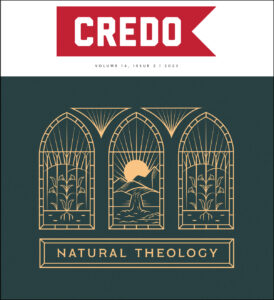
Wholesome Protestant Doctrine: Is Actus Purus Necessary for the Health of the Church?
I recently had a conversation with my good friend, former pastor, and fellow Credo editor Sam Parkison. As is often the case, our conversation drifted towards theology – specifically classical theism, as we are nothing but consistent (i.e., predictable). W e discussed what motivates various people to pursue classical theism, and Sam made a critical point. “For me,” he said, “it’s life or death. This isn’t a game. I believe the health of the evangelical church is at stake.” This mindset makes the retrieval of classical doctrines a very practical and pastoral matter. Theologians do not study minutia for the sake of winning Doctrinal Trivial Pursuit or to impress their colleagues around the coffee maker. Rather, the best theologians are churchmen who submit to heavy lifting in their studies to make doctrines accessible from their pulpits. In short, they care about the renewal of the church.
e discussed what motivates various people to pursue classical theism, and Sam made a critical point. “For me,” he said, “it’s life or death. This isn’t a game. I believe the health of the evangelical church is at stake.” This mindset makes the retrieval of classical doctrines a very practical and pastoral matter. Theologians do not study minutia for the sake of winning Doctrinal Trivial Pursuit or to impress their colleagues around the coffee maker. Rather, the best theologians are churchmen who submit to heavy lifting in their studies to make doctrines accessible from their pulpits. In short, they care about the renewal of the church.
Natural Theology and the People of God
Many of the articles and columns in this issue of Credo Magazine focus on Thomas Aquinas’s Five Ways. Some scholars believe that tying classical theism to the doctrine of God as presented by Thomas is a fatal misstep. Jefferey Johnson, for instance, expresses this concern by writing, “Some would argue that many Protestants are drawn to this Catholic scholar not so much for his soteriology or his ecclesiology but for his theology proper. This may be true. But I am convinced that Aquinas’s doctrine of God was wrong as well. The best theologians are churchmen who submit to heavy lifting in their studies to make doctrines accessible from their pulpits. Click To TweetMore than that, I am persuaded that his doctrine of God is problematic for a proper view of classical theism. Classical theism is not Thomism.”[1] Indeed, Johnson pinpoints the practical and pastoral dangers of a renewed interest in Thomas by Protestant scholars, “As a Protestant, I am troubled by the resurgence of Thomistic thinking within Protestant Christianity. As a Reformed Baptist, I am increasingly concerned by the newfound attention this Catholic theologian is receiving among many in my own camp. And as a pastor, I am deeply disturbed that this revival of Thomism is slowly slipping down from academia into our churches.”[2] Now, my priority in this column is not to give a defense of “Thomism,” and I can certainly appreciate a pastor’s concern for the spiritual well-being of his people, and this protective duty certainly entails protecting them from false teachers. I was, however, surprised to see Johnson list one specific doctrine as cause for concern – Actus Purus.
Johnson goes so far as to write, “Actus Purus is Not the God of the Bible” [3]. Now, specifically Johnson has in mind the Unmoved Mover of Aristotle, which he believes Thomas Aquinas accepted with minor revisions. Still, the wording is surprising since it springs from someone who obviously cares about the Reformed tradition – a tradition replete with the language of Actus Purus. Francis Turretin, William Ames, and Stephen Charnock, to list a few of many possible examples, all described the God of the Bible as the God of pure act. Johnson’s chief concern, as far as I can tell, is that Actus Purus and Thomas’s appropriation of Aristotle’s Unmoved Mover necessitates belief in an immobile God rather than an immutable God. For those who are well versed in the language of the Angelic Doctor, Johnson claims that Thomas’s doctrine of God lacks both “passive potency” and “active potency.”[4] In other words, Thomas’s God cannot be moved by another, nor can He move Himself. Thus, a Thomistic form of natural theology may result in a static and impersonal “god,” rather than the God of Abraham, Isaac, and Jacob.
Good News, Everyone!
I would like to briefly comment, then, on Thomas’s First Way, the God of Pure Act, and Thomas’s “Aristotelianism.” In so doing, my goal is to comfort rather than agitate. It is very appropriate for a pastor, scholar, and theologian to care about what is being fed to his people and to offer concerns about the value of the subject matter. Additionally, it is quite appropriate to voice concerns when they are felt, so I do not blame anyone for asking questions or verbalizing public disagreements. The good news, however, is that such concerns about divine immobility in Thomas’s theology are unfounded.[5]
First, Johnson is correct to reject the UnMoved Mover as an adequate model of God. In fact, he follows Thomas in doing so (which should make everyone happy)! The literature on this point is extensive so I will not belabor the argument here, but it is sufficient to say that Thomas’s Aristotelianism can easily be overstated. While it is true that Thomas used Aristotelian concepts, he did not hesitate to correct or rebuke “the Philosopher” or to modify Aristotle’s arguments with Platonic concepts. Additionally, both Greek thinkers were relegated to the lower ranks as the highest tiers of authority were given to Scripture and then the Fathers. Now, it is certainly possible to argue that Thomas did not dissociate himself from Aristotle enough. It is a significant mistake, however, to assume that Aristotle’s UnMoved Mover and Thomas’s doctrine of God are identical. Rebuking Aristotle does not nullify Thomas’s arguments because they are not the same.To adequately disagree with Thomas we would have to argue that the natural world does not demonstrate God's existence, which seems like a bad route to take and certainly one indebted to modernist commitments. Click To Tweet
Second, one must understand the limits of Thomas’s natural theology. Thomas does not believe that natural theology will lead anyone to the Triune God of the Bible or the Incarnation of Christ Jesus. As such, special revelation is absolutely necessary. Again, this is a good thing and many Reformed thinkers have followed suit (as noted throughout this issue of Credo Magazine). Additionally, Thomas’s use of the word “prove” (as in, one can “prove” the existence of God), is more akin to a type of “demonstration” rather than a mathematical formula, and this is especially the case when one of his arguments is isolated from the others. Thomas’s argument from motion was never intended to be the last word on the subject. Indeed, I must confess I find it odd when Protestants disagree with these arguments because it would require that we show why the existence of motion fails to demonstrate the existence of God. Unless I am mistaken, to adequately disagree with Thomas we would have to argue that the natural world does not demonstrate God’s existence, which seems like a bad route to take and certainly one indebted to modernist commitments.
Third, and most important, Thomas’s argument from motion does not necessitate a belief in an immobile God. Indeed, Thomas did not even believe that God lacked active potency. As a matter of fact, one cannot hold to divine omnipotence, as Thomas did, and reject active potency (omni-potentia). This, of course, is a mistake due to lack of familiarity with Thomas and scholastic vocabulary. Both Medieval and Reformed authors often used the word “potency” or “potentiality” as short-hand for “passive potency,” without rejecting “active potency.” For a recent example, Peter Kreeft explains in his commentary on the Summa that, “God is always active, dynamic, and willing, yet not in process and time and potentiality.”[4] While passive potency refers to one’s ability to receive change, active potency refers to one’s ability to impart change to another. As such, God is not moved by external factors, but he does move all things, and this distinction does not contradict the common language of actus purus. Again, it is possible to disagree with actus purus. Open theists, process theologians, and other forms of “theistic mutualism” (if I may borrow a phrase) will argue that God does possess passive potency and, thus, can be changed by external factors. This reciprocity is what Thomas wishes to avoid when he discusses “real relationships” – but that is another column for another day.

